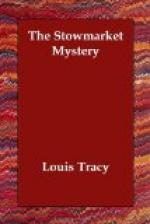After the duel in 1763, David Hume, the man who avenged with his sword the supposed injury inflicted upon his father by the first Sir Alan Hume-Frazer, escaped to the Netherlands, and was never heard of again.
There was a local tradition on the Scotch estate that five Hume-Frazers would meet with violent deaths in England. The reason for this singular belief was found in the recorded utterances of an old nurse, popularly credited with the gift of second sight, who prophesied, after the outlawry of the Humes in 1745, that there would be five long-lived generations of both families, and that five Frazers would die in their boots.
“Curiously enough,” commented the old gentleman who supplied this information, “Aunt Elspeth’s prediction is capable of two interpretations, owing to the fact that the first Sir Alan Frazer assumed the additional surname of Hume, I have absolutely no knowledge of any distinct branch of the Hume family. David Hume’s sister was married to my ancestor at the time of the duel.”
Admiral Cunningham, the hardy old salt who brought from Japan the sword used by a Samurai to commit hari-kara, or suicide by disembowelling, commanded the British vessels of the combined squadron which sailed up the Bay of Yedo on July 6, 1853, to intimidate the Mikado.
He narrowly escaped assassination
at the hands of a two-sword man,
who was knocked down by a
sailor and soundly kicked, after being
disarmed.
The Admiral brought home the
two weapons taken from his assailant,
and the larger sword was still
to be seen in the armoury at Glen
Tochan.
The three brothers, of whom the writer alone survived, quarrelled over money matters about eight years before the murder of the fifth baronet. The youngest, Charles, had entangled himself in a disastrous speculation in the city, and bitterly reproached Alan and David (the narrator) because they would not come to his assistance.
The old gentleman laboured through many pages to explain the reasons which actuated this decision, but Brett skipped all of them.
Finally, he suspected no one of committing the crime itself, which was utterly inexplicable.
At Stowmarket the barrister sought a few minutes’ conversation with the stationmaster.
“Have you been long in charge of this station?” he asked, when the official ushered him into a private office.
“Nearly five years, sir,” was the surprised answer.
“Ah, then you know nearly all the members of the Hume-Frazer family?”
“Yes, sir. I think so.”
“Do you remember the New Year’s Eve when the young baronet was killed?”
“Yes, generally speaking, I do remember it.”
The stationmaster was evidently doubtful of the motives which actuated this cross-examination, and resolved not to commit himself to positive statements.




